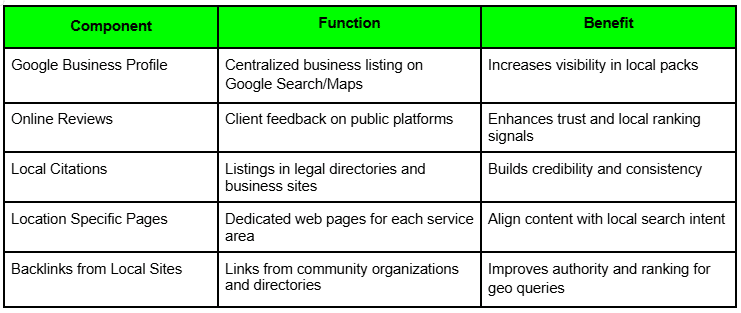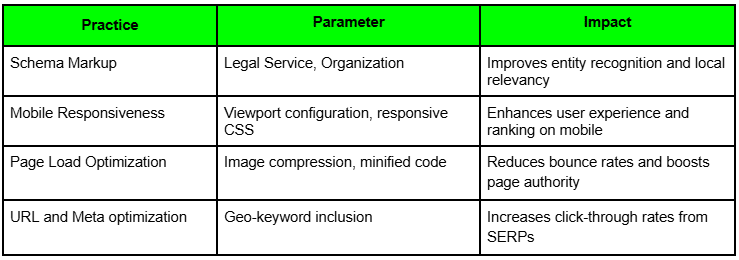
Local search drives 46 percent of all Google queries, making Local SEO for law firms the key to capturing clients in specific geographic areas. In this guide, you will discover how to claim and optimize your Google Business Profile, manage reviews, conduct geo-targeted keyword research, build local authority through citations and backlinks, implement technical SEO best practices, and measure success with actionable KPIs. These strategies will help your firm stand out in local packs, increase website visits, and convert prospects into cases with measurable growth.
Local SEO for law firms is the process of optimizing a legal practice’s online presence to appear prominently in location-based search results such as Google’s Local Pack and Maps. By focusing on proximity, relevance, and authority signals, attorneys connect with clients searching for legal services nearby, boosting qualified leads and caseload growth.
Local SEO targets geographical intent rather than broad queries. While general SEO optimizes for national or practice-area keywords (e.g., “personal injury lawyer”), local SEO emphasizes city names, “near me” modifiers, and map listings. This geographical layer improves visibility for clients ready to engage with attorneys in their vicinity.
Local SEO drives direct client engagement by putting a law firm in front of prospects who are actively seeking services within their community. Firms featured in Google’s Local Pack receive up to five times more profile views and double the engagement of non-listed competitors. For example, a personal injury firm optimized for “Chicago personal injury attorney” saw a 78 percent increase in phone calls within three months.
Optimizing Local SEO for legal practices involves several interrelated elements that build and reinforce local authority.
Below is a comparison of core Local SEO components, their functions, and the benefits they deliver.

Each component drives a specific local ranking factor, preparing your firm to delve into detailed optimization tactics that follow.

Claiming and fully optimizing a Google Business Profile (GBP) sets the foundation for local visibility. This profile signals to Google and clients where your firm is located, what services you offer, and why you stand out.
To claim your GBP, sign in to Google Business Profile Manager with your law firm email, search for your law firm’s name, and select “Claim this business.” Verification options include receiving a postcard with a unique code or instant verification via phone or email if eligible. Completing verification unlocks profile editing and analytics features.
Begin by selecting precise categories such as “Personal Injury Attorney” or “Family Law Attorney” to reflect your specialty. Under the Services section, list each practice area with detailed descriptions and pricing tiers if applicable. Precise categorization and service definitions help Google match your profile to relevant legal queries.
To further optimize your Google My Business profile, check and take inspiration from what your direct competitors are doing with theirs. Apply the most common denominators among your top competitors on your profile. If their Google Posts strategy consists of sharing their blog posts and promotional videos of their services, do the same on your profile.
Regularly publishing GBP Posts about case outcomes, community events, or legal tips adds fresh content that encourages engagement. A robust photo gallery—featuring your office, team, and branded events—improves click-through rates by up to 35 percent. Posting short videos explaining common legal processes builds client confidence and signals active profile management.
Google Business Profile posts can be a game-changer. These short updates give you the ability to share important announcements, promote events, highlight special offers, and showcase your products directly in search results and Google Maps. Regularly updating your Google Profile with posts ensures it stays fresh and complete, which signals to Google that your business is active and engaged with its audience.
Many firms fail to maintain consistent NAP (Name, Address, Phone) information across all directories, leading to ranking penalties. Avoid generic descriptions, incomplete service listings, and outdated business hours. Ensuring every detail is accurate prevents lost opportunities and supports seamless client interactions.

Online reviews are a crucial factor in determining how well local businesses perform in search results, influencing how businesses are perceived by potential customers and playing a significant role in local search engine optimization (SEO). Positive reviews can boost a business’s visibility and attract more customers, while negative reviews can have the opposite effect. Search engines consider reviews as a key factor in their ranking algorithms.
Encourage satisfied clients to share their experiences by sending personalized follow-up emails with direct links to your GBP review form. Implement an internal feedback workflow to address concerns before they become public. Hosting client appreciation events can also generate positive word-of-mouth and reviews on directories relevant to legal services.
A prompt, professional response to positive reviews—thanking clients by name—reinforces trust and encourages referrals. When addressing negative feedback, acknowledge the client’s concern, offer to resolve the issue offline, and demonstrate your commitment to client satisfaction. Constructive handling of criticism showcases your firm’s integrity and service standards.
Google considers review quantity, velocity, and rating averages when ranking Local Pack listings.
Maria Vidal, (2024-05-29)
A study by Moz reveals that online reviews make up approximately 15% of the factors influencing local search rankings. The quantity and freshness of your online reviews matter for local SEO. A study by BrightLocal found that 73% of consumers believe that reviews older than three months are no longer relevant.
Firms with a 4.5-star rating or higher typically outrank competitors with fewer or lower-scoring reviews.
MARA Solutions, (2024-06-12)
Studies indicate that a 5-star rating can boost clicks from the Google Local Pack by 25%, and 56% of consumers prefer businesses with positive reviews in the Local Pack. Reviews influence local rankings by building trust and encouraging user interaction.
From a prospect’s perspective, 93 percent of consumers read online reviews before choosing a lawyer, making stellar reputation management vital for conversion.
Geo-targeted keyword research and localized content ensure your website aligns with how clients search for legal help in their area.
Use keyword tools to filter search queries by geographic modifier and search volume. Combine core practice areas (e.g., “estate planning”) with city or region terms (e.g., “estate planning lawyer Denver”). Analyze competitor landing pages to discover long-tail phrases such as “affordable wills attorney near me” and incorporate them into your content strategy.
WEBRIS, (2025-02-18)
Success in local SEO starts with understanding your market and identifying high intent, high volume keywords as building blocks for your campaign. By using AI-powered tools and local modifiers, you can identify valuable keywords your competitors are missing and dominate local search results.
Dedicated landing pages for each service area let you tailor content, testimonials, and local case studies to resonate with prospects in that community. A location-specific page focusing on “Family Law in Austin, TX” can rank for hyper-local searches, improving both relevance and proximity signals that Google uses to deliver local results.
Structure sentences to mimic conversational queries such as “best DUI lawyer near me” and include FAQ-style headings that contain “near me.” Use schema-inspired headings like “What to Ask a DUI Attorney in Houston.” These practices help capture voice searches that rely on natural language patterns.
Publishing articles such as “Understanding Chicago’s Personal Injury Statute of Limitations” or “Top 5 Probate Pitfalls in Broward County” positions your firm as an expert on local legal matters. Local news commentary and community event recaps also reinforce your geographic relevance and authority.
Citations and backlinks from reputable local sources validate your firm’s legitimacy and reinforce location-based ranking signals.
Begin with high-authority directories such as Avvo, Justia, Martindale, and your local Bar Association listings. Ensure your NAP details match exactly across each entry to prevent inconsistencies that dilute your citation authority.
Juris Digital, (2025-04-15)
Local citations are online mentions of your law firm’s name, address, and phone number (NAP). These can appear on various platforms, including legal directories, social media platforms, Google My Business listings, and other websites. Ensure your NAP information is consistent across all directories.
Partner with legal aid organizations, sponsor local bar association events, or contribute guest posts to regional business journals. Each backlink from a recognized community entity boosts your domain authority and communicates trustworthiness to search engines.
Compile a master spreadsheet of your firm’s official name, address, and phone number. Audit major directories quarterly to identify discrepancies and correct any variations such as abbreviations or outdated suite numbers. This diligence supports cohesive local SEO signals.
Generative Engine Optimization, (2024-05-29)
Technical SEO encompasses sophisticated optimizations that enable search engines, such as Google, to efficiently crawl, index, and showcase a law firm’s website in search results. Technical SEO is crucial for law firms because it enhances your website’s performance and visibility, directly impacting your ability to attract and convert clients.
Implement Legal Service schema to define your offerings, addresses, and service areas. Embedding markups such as Organization and LocalBusiness tags on your homepage helps search engines accurately associate your firm with geographic queries and practice areas.
Generative Engine Optimization, (2024-05-29)
Schema markup, implemented via JSON-LD or microdata, is structured data added to a law firm’s website HTML to enhance search engine understanding of content like services, attorney credentials, and contact details. By adding structured data from Schema.org to your website, you make it easier for search engines to understand, categorize, and present your content. Implementing the LegalService schema can help your site rank higher for targeted queries.
DAGMAR Marketing
Schema markup is a form of structured data that helps search engines understand the content on your website more effectively. For US law firms, schema markup can be a game-changer. It can help you stand out in search results with rich snippets and improve your local SEO.
With over 88 percent of local searches conducted on mobile devices, responsive design and fast load times are essential. A mobile-optimized site that loads in under three seconds reduces bounce rates and improves dwell time, signaling relevance and quality to Google’s algorithm.
Include city names and primary keywords in URL slugs (e.g., ) and meta titles (e.g., “Chicago Personal Injury Lawyer | Your Firm Name”). Craft meta descriptions that highlight your local presence and call to action, prompting clicks from search results.
Below is a table comparing key technical SEO practices, their parameters, and the impact they deliver.

These technical improvements create a foundation for strong local visibility and seamless client experiences on any device.
Tracking the right metrics ensures you can refine strategies, justify ROI, and maintain a competitive advantage.
Focus on Local Pack ranking positions for targeted geo-keywords, Google Business Profile views and actions (website clicks, calls, direction requests), organic traffic to location pages, and conversion rates from contact form submissions or phone inquiries.
Use Google Business Profile Insights for profile engagement metrics, Google Search Console for query analysis and index coverage, and specialized solutions like BrightLocal or Moz Local for automated rank tracking and citation audits.
Conduct a comprehensive audit quarterly to review citations, backlink profiles, content freshness, and technical health. Bi-annual reviews can reassess keyword priorities and deeper competitive comparisons, while immediate updates are recommended after significant algorithm changes or service area shifts.
Local SEO is an ongoing process that, when managed methodically, continues to yield increased visibility, higher-quality leads, and sustainable growth for legal practices.
Engaging these strategies positions your firm at the forefront of local search, driving more consultations and cases. Partnering with specialized Local SEO providers ensures that every technical detail and content asset works cohesively to convert local seekers into clients. Continuous monitoring, regular optimizations, and community engagement will keep your law firm competitive in local markets.
Our specialty is law firm marketing and SEO for lawyers at FORWARD Lawyer Marketing. Contact us for a free site review and consultation at (888) 590-9687 to discuss how we can increase the revenue of your law firm.